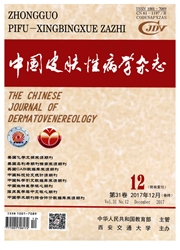

 中文摘要:
中文摘要:
目的体外研究周期性机械应力刺激对成纤维细胞生物学行为的影响,进一步了解皮肤创面愈合的生物学机制。方法原代提取人真皮成纤维细胞(human skin fibroblasts,HFB)。采用Fx-4000柔性基底应变加载系统对HFB施加周期性机械拉伸,流式细胞仪检测细胞周期,实时荧光定量PCR检测各组成纤维细胞内Ⅰ,Ⅲ型胶原蛋白mRNA的表达,ELISA方法检测各组上清液中Ⅰ,Ⅲ型胶原蛋白的浓度。结果与静态对照组比较,10%拉伸幅度加载培养24h后,细胞增殖明显;10%拉伸幅度作用24h,48h可以促进成纤维细胞Ⅰ,Ⅲ型胶原蛋白mRNA的表达;20%拉伸幅度作用24h,48h可以促进上清液中Ⅰ,Ⅲ型胶原蛋白的合成。结论力学刺激可以改变HFB的细胞周期,促进HFB的增殖;也能够影响细胞外基质中Ⅰ,Ⅲ型胶原蛋白的代谢,且与力学刺激的幅度和时间有关。
 英文摘要:
英文摘要:
Objective In order to further understand the biological mechanism of skin wound healing, we studied the effects of cyclical mechanical stress stimulation on fibroblasts biological behavior in vitro. Methods HFB was extracted and cultured. The FX-4000 loading system was used to perform the periodically tensile stimulation on the HFB. Flow cytometry (FCM) was used to determine cell cycle, cells and the corresponding culture supernatant were extracted to determine the expression of mRNA of Ⅰ, Ⅲ collagens using the RT-PCR method. ELISA was used to detect the concentrations of Ⅰ,Ⅲ collagens in the supernatant of different groups. Results Compared with the control group, the proliferation of HFB significantly increased in the group of 10% stretch in 24 hours ; the expression of mRNA of fibroblasts type Ⅰ, m collagens were promoted in the groups of 10% stretch in 24 hours and 48 hours ; the synthesis of type Ⅰ, Ⅲ collagens were promoted in the groups of 20% stretch in 24 hours and 48 hours. Conclusion The cell cycle was changed and the proliferation of HFB was promoted after tensile stimulation; the extracellular matrix Ⅰ, Ⅲ type collagen metabolism of fibroblast was also influenced, and this influence was correlated with the rate and time of the stimulation.
 同期刊论文项目
同期刊论文项目
 同项目期刊论文
同项目期刊论文
 期刊信息
期刊信息
